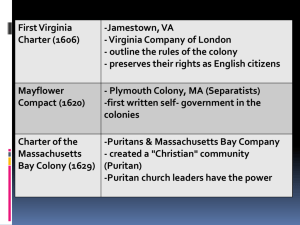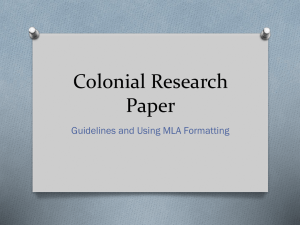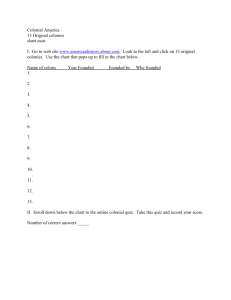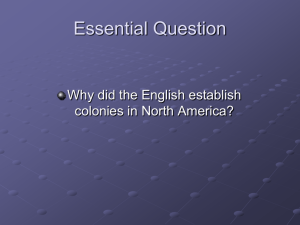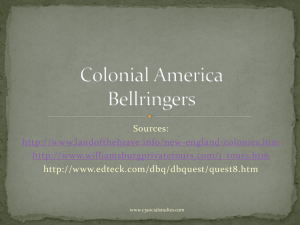Colonial America - Mater Academy Lakes High School
advertisement
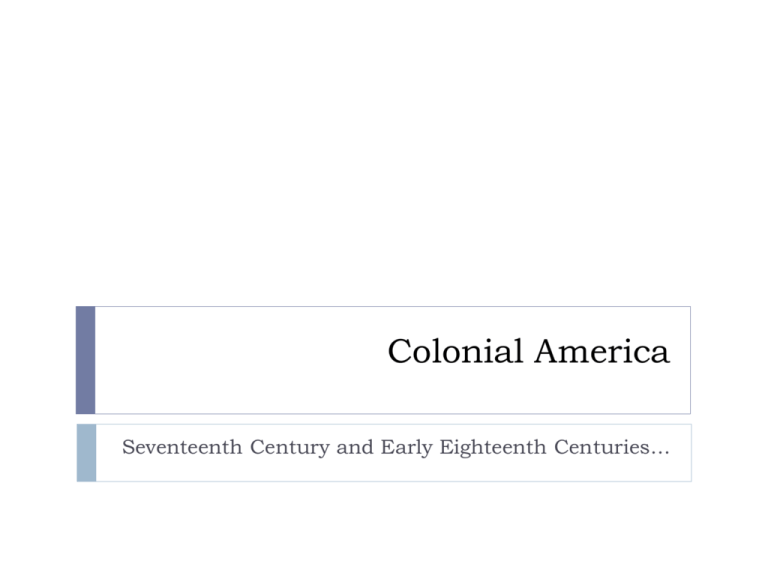
Colonial America Seventeenth Century and Early Eighteenth Centuries… Colonial America- Jamestown Colonies established primarily for economic and/ or religious reasons. 1607 England’s 2nd attempt at settling in North AmericaJamestown for economic reasons. *joint stock company;Virginia Company. *many came searching for gold. “not available- fool’s gold”. *settlers typically not “equipped” (physically and literally). *helped by Native Americans of the Powhatan Confederacy. *Jamestown only survived because ships kept arriving with new colonists. *John Smith- “he who will not work shall not eat”. Continued Winter 1609-1610 ; Starving Time John Rolfe *Married Pocahontas *Tobacco pioneer (eventually leads settlement projection in Virginia as well as plantation slavery – cause and effect, prior knowledge!) *Brings in new settlements around Jamestown Chesapeake colonies (Virginia and Maryland) *those who migrated did so for financial reasons *indentured servitude (75% out of 130,000) *headright system (1618) ; 50 acres in land grants and basis of “power in the hands of a small & wealthy group. *House of Burgesses (1619) first REPRESENTATIVE government in America. Granted suffrage to property owning white males The French in North America (relevant side note)…. 1608; Quebec French Jesuit priests attempted to convert natives to Roman Catholicism More likely to spread diseases Tried to colonize as much land as possible Find Asia Mostly single men who intermarried with natives Stayed on the move coureurs du bois (runners in the wood) Fur Trade Relevance: French Indian War aka 7 Years War (1754-1763)… stay tuned! (cause and effect- prior knowledge) Colonial America- Massachusetts Bay Colony; The Pilgrims (16th Century) Puritanism in England persecution look for a place to practice their faith New World! Separatists; completely abandoned the Church of England (Mayflower. 1620) Set sail for Virginia but accidently land in Plymouth, Massachusetts. Travelers – Pilgrims sign the Mayflower Compact *government’s power comes from the CONSENT of the governed, not from God. *Absolutists Also received help from Native Americans- Squanto (1629) Massachusetts Bay colony established *Congregationalists * (1629-1642) Great Puritan Migration Massachusetts Bay Colony, Continued… Governor John Winthrop * Calvinist ideals/ principles * City upon a hill * Puritan ideals *Government was to be a covenant among people, work must serve a communal ideal and Puritan ideals should always be followed and the church served. *Ironically, no room for religious tolerance *Religious intolerance actually led to the founding of other colonies…(Cause and effect) Continued. Religious Intolerance (effect) Salem Bay minister Roger Williams- challenged Puritan’s authority. (Separation of Church and State) *Williams banished. * Starts Rhode Island Anne Hutchinson – questioned/ challenged religious authority (heresy). God’s grace would be enough to earn a place among the elect (not legalism). * Tried and convicted * banished….to Rhode Island Continued… *Puritan Immigration to New England *Chesapeake v New England Comes to a standstill (1649-1660) *Oliver Cromwell’s rule in England *English Civil Wars *Death of Cromwell (1658) *Stuarts reign again (1660) *Republican Ideals (cause and effect) New England: families, longer life-span, community, more religious (meetinghouses) Chesapeake: single men, tobacco/climate- shorter life span, lonelier, less religious. Other Colonies Proprietorships Population in Massachusetts grows, start looking for new places to settle. Connecticut Valley Pequot War Many colonies were proprietorships (gifts from the King hence owned by one person). Eventually leads to rebellion. Revolution ideologies? (cause & effect, prior knowledge) Connecticut (1635) Fundamental Orders Maryland (Lord Baltimore) haven for Catholics profit from tobacco religious tolerance (Protestants vs Catholics Act of Toleration (1649) Continued... New York- gift from the King to his brother, James *1664 Charles II wages ware on the Dutch (original populates but posed economic threat to G.B) * James becomes Duke of York * (1685) becomes King N.Y a royal colony. New Jersey – sold off to Quaker investors. Pennsylvania (Quaker’s own colony) *William Penn (Quaker) • Good friends with Charles II Charles II saw Quakers as radicals. • Liberal Policies regarding religion (tolerance) • Better treatment toward Native Americans • One of the fastest growing colonies • Backlash • Penn’s deal with the Natives. * Proprietary Continued… * Slavery Carolinas (1729) Split – N & S Carolina North Carolina- (Virginia) South Carolina- (Englishmen- Barbados- African Slavery) ----------------------------------------------- African American Slavery (cause) Native American slaves- difficult African Americans did not know the land Language barriers Easier to identify (1790) 750,000 blacks enslaved Middle Passage- Triangular Trade Route (conditions) Transatlantic Slave Trade (1808) (cause and effect/ prior knowledge) Thrived in the South- Labor intensive work (tobacco & rice) North- Farms (NY & NJ), house servants Salutary Neglect & Regulation of Colonial Trade G.B did not quite interfere with colonist affairs Autonomy rhetoric (self rule) Road to Revolution? (cause & effect, prior knowledge) America develops it’s own culture Period lasts until French Indian War (1750) ------------------------------------------------------------------- English Regulation on Colonial Trade Mercantilism – Specie Encouraged manufacturing in England protective tariff Navigation Acts (1651-1673)- smuggling Attempts to strengthen act: vice-admiralty courts (no jury) Entirely dependent on England, no uprising. Colonial Government Large self-government rhetoric/ ideology Every colony had a governor Legislature Highly dependent on the cooperation o f the colonist. Efforts to centralize government (by the colonists): New England Confederation (typically dealt with small issues, settled disputes). Notable Events Bacon’s Rebellion (1676): Class resentment. Nathanial Bacon vs. Governor Berkeley Western settlers facing Native American attacks Jamestown didn’t want to risk full scale war Lashed out at Natives anyway Burn down Jamestown Ends with Bacon’s death ----------------------------------------------------------------------- King Phillip’s War Wampanoags led by “King Phillip” End of Native American presence New England. Notable Events, Continued… Stono Uprising (1739)- first, one of the most successful slave uprisings. Restrictive laws to govern slave behavior. ---------------------------------------------------------------------------- Salem Witch Trials (1692) Over 130 “Witches” executed or sent to jail Reasons: some say it was a “battle of the classes” Or paranoia may have been a result of recent attempts of absolute rule. (Dominion of New England) Glorious Revolution suffrage to all Protestants (Puritans paranoid would weaken their religion). Halfway Covenant Great Awakening (1730s-1740s) Religion dies down in colonies early 1700s Attempt to rekindle spirit of Puritanism If we could make religious decisions on our own, we can also make political decisions on our own! Jonathan Edwards & George Whitefield Edwards: Influenced by Enlightenment (Ben Franklin- Poor Man’s Almanack) “Sinners in the Hands of an Angry God”. Very graphic depictions of hell Damnation of those not “awakened” to true religion (Calvanism) Whitefield: Evangelical (traveled the colonies) Former actor with great speaking skills; Attracted over 6,000 Based on Emotionalism and Spiritualism Life in the Colonies Rate of growth; 1700= 250,000 & 1750= 1,250,000 Populations extend beyond English European Scotch-Irish, Scots, Germans, Blacks ------------------------------------------------------- 90% lived in rural areas Labor divided among gender Socializing ----------------------------------------------------------------- Conditions in cities Much worse than countryside Sanitary conditions, population, epidemics Positive: contact with more people, progress and education. * Education * Differences Education was rare. Not strange to find a hand few of colonists with only a mediocre education, if any. Work first, education secondary Colleges existed solely to train in in ministry. ------------------------------------------------------------ Various colonial regions differed considerably. Assessment! Pg. 91

